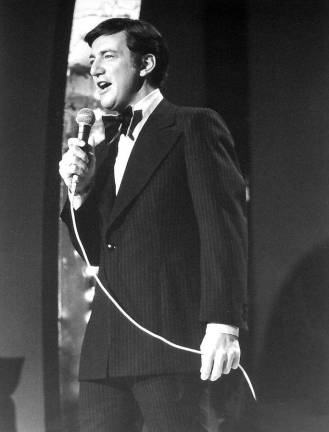A Personal Bobby Darin Memory
Darin burst upon the scene in the early 60s with his first big hit “Splish Splash” although is probably best remembered for his cover of “Mack the Knife.” Darin pushed to get more political and was active in Bobby Kennedy’s 1968 presidential campaign and was present when he was assassinated.

I must confess. Although I have been reviewing theater for a decade or so by now, rarely have I looked so forward to a show as I have for Just In Time. Now at the Circle in The Square, this is the one in which Jonathan Groff plays the late and great Bobby Darin. I saw Groff “try it out,” so to speak, at the 92Y seven years ago, and wondered if he (who won a Tony last year for Merrily We Roll Along) would take this all the way to Broadway. Well, he has.
It is now a two-and-a-half-hour, glitzy, and immersive experience, during which we follow the singer from “Splish Splash” to “If I Were a Carpenter.” And from a relationship with Connie Francis to his marriage to Hollywood sweetheart Sandra Dee. And we watch him learn some shocking truths about where . . . and from whom . . . he came.
My special interest is because I got to know Darin in a weird way, and at what turned out to be a pivotal point in his life.
Even though I was already a working journalist, I signed up for a creative writing class at UCLA Extension. It was a night class, and I quickly noticed a slightly older man sitting in the back who looked familiar. He had a mustache and was dressed in denim. Yes, it was Darin, who during this period was trying to be called Robert or Bob. He had recorded “If I Were a Carpenter” and was trying to push old “Mack” off the radar. I admired his current work, and told him so when we had a break. He thanked me and immediately asked me to go out after class. Rarely have I said yes more quickly.
Whenever anyone asks if I’ve seen the great film The Battle of Algiers, I have to name-drop and admit I saw it with Bobby Darin. We were both politically involved—anti-war campaigns and beyond—at the time. He was trying to be Bob Dylan, had worked for Bobby Kennedy, and introduced his song “Simple Song of Freedom” at the famous Los Angeles folk club the Troubadour. He was living at that time in a trailer in Topanga Canyon, while I was in a bungalow nearby in Malibu.
We saw each other a few times, but our lives obviously took very different turns. His career stalled and mine was just getting journalistically busy. Fast—well, not so fast—forward to a year or two later, when I was doing an interview with Julio Iglesias at a recording studio in Hollywood. Suddenly, one of his aides came in and excitedly announced, “Bobby Darin is recording down the hall!” I excused myself and cautiously wandered down to that other studio. There he was in suit and tie, denim and mustache gone, and preparing for an engagement, I believe, in Las Vegas. (In the play the emphasis is on a return to New York’s Copacabana.) Old Mack was back.
He gestured for me to wait. When he came out, I asked if he remembered me. “Malibu,” he said sweetly. I asked what became of Robert Darin and he sadly admitted, “They wouldn’t accept him.” He died about a year later at age 37.
I so admire Jonathan Groff and company for telling the complicated life of this artist: one who left us way too soon, but packed a lot in. I do think Darin aspired to make more of a political difference, and I encourage everyone to go to Youtube and watch him, guitar in hand, singing “Simple Song of Freedom.” That’s the Bobby Darin I choose to recall.
Michele Willens’s Stage Right...Or Not airs weekly on robinhoodradio.
“Whenever anyone asks if I’ve seen the great film The Battle of Algiers, I have to name-drop and admit I saw it with Bobby Darin.”